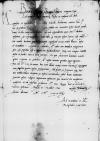List #393
Bona Sforza do Ioannes DANTISCUSRadom, 1528-02
| odebrano Madrid, [1528]-09-25 Rękopiśmienne podstawy źródłowe:
Pomocnicze podstawy źródłowe:
Publikacje:
| ||||||||||||
Tekst + aparat krytyczny + komentarz Zwykły tekst Tekst + komentarz Tekst + aparat krytyczny Ekscerpty dotyczące podróży Dantyszka
Magnifico et spec paper damaged⌈[Magnifico et spec]Magnifico et spec paper damaged⌉tabili
Magnifice et spectabilis, since paper damaged⌈[since]since paper damaged⌉re nobis dilecte.
Habuimus antea litteras
S(incerita)tis or S(trenuita)tis⌈S(incerita)tisS(incerita)tis or S(trenuita)tis⌉
Tuae, ex quibus intelleximus paper damaged⌈[imus]imus paper damaged⌉, in quo cardine res
Quam bene et feliciter valere optamus.
Dat(ae) or Dat(um)⌈Dat(ae)Dat(ae) or Dat(um)⌉
in
Ad mandatum s(acrae) or s(erenissimae)⌈s(acrae)s(acrae) or s(erenissimae)⌉ maiestatis reginalis proprium


 BCz, 3465, p. 86
BCz, 3465, p. 86